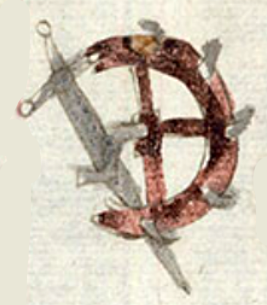Santa Catalina (CST27)
This painting of the simplex glyph for the saint’s name, Santa Catalina (St. Catherine of Siena), shows a sword and an apparently wooden wheel with sharp protruding blades. This wheel is only partial, with three visible spokes. The hub has a crank handle. The sword is upright, with the point down. It has a grip and a crossbar. It looks much like the sword associated with San Pablo. The glyph with two signs, shown here, are the Catholic symbols of Catherine’s martyrdom serving here much like glyphs.
Stephanie Wood
For more on the Codex Sierra, see Kevin Terraciano’s study (2021), especially p. 15, Fig. 2.2. Glyphs of saints can be found in this digital collection, some with more Nahua influence than is visible this one. See below.
Stephanie Wood
santa catalina
Santa Catalina
Stephanie Wood & Jeff Haskett-Wood
1550–1564
Jeff Haskett-Wood
iconografía cristiana y Católica, nombres de santos, nombres de mujeres

Santa Catalina
Stephanie Wood
Códice Sierra-Texupan, plate 27, page dated 1559. Origin: Santa Catalina Texupan, Mixteca Alta, State of Oaxaca. Kevin Terraciano has published an outstanding study of this manuscript (Codex Sierra, 2021), and in his book he refers to alphabetic and “pictorial” writing, not hieroglyphic writing. We are still counting some of the imagery from this source as hieroglyphic writing, but we are also including examples of “iconography” where the images verge on European style illustrations or scenes showing activities. We have this iconography category so that such images can be fruitfully compared with hieroglyphs. Hieroglyphic writing was evolving as a result of the influence of European illustrations, and even alphabetic writing impacted it.
https://bidilaf.buap.mx/objeto.xql?id=48281&busqueda=Texupan&action=search
The Biblioteca Digital Lafragua of the Biblioteca Histórica José María Lafragua in Puebla, Mexico, publishes this Códice Sierra-Texupan, 1550–1564 (62pp., 30.7 x 21.8 cm.), referring to it as being in the “Public Domain.” This image is published here under a Creative Commons license, asking that you cite the Biblioteca Digital Lafragua and this Visual Lexicon of Aztec Hieroglyphs.





